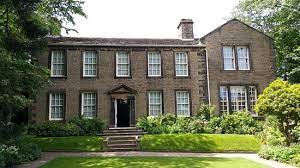The Charm of the Brontë Gloom
 |
| Brontë Museum, Haworth |
Leading the list of the
umpteen places that I would love to visit is Haworth of the Brontës.
Haworth is a village in England where the three illustrious Brontë
sisters lived until their premature deaths. Two of the sisters and their only brother
died when they were only 29, 30 and 31 respectively. The other one managed to
live to the age of 39. Their unfortunate father, Rev Patrick Bronte, endured
all that along with the death of his wife much earlier. It was a gloomy life
for all of them. On a gloomy landscape. The landscape where Charlotte Brontë’s
Jane Eyre, Anne’s Agnes Grey and Emily’s Catherine lived out their passions,
dreams and frustrations.
All the four Brontë
children were brilliant. The boy, Branwell, was considered to be a genius by
his father and sisters. He was tutored at home rigorously by his religious
father. His poetry earned much praise. He painted admirable portraits. A
talented man he was. But he ended up as a drifter. Addicted to alcohol and
drugs, he succumbed to death at the age of 31. In his last moments, he wanted
to demonstrate the power of the human will and insisted on dying standing up.

The Church, Haworth
The sisters
were a little more successful. Or less unfortunate, let’s say. Their novels and
poems drew much attention though the orthodox Victorians were not very happy
with characters like Jane Eyre and Catherine Earnshaw.
However,
England liberated itself from the absurd Victorian morality. Today the
birthplace of the Brontës, Thornton village, is like a
pilgrimage centre. The place they lived out their tragic lives, Haworth, is a
tourist centre that people like me put on the top of their post-Covid
destinations.
It’s not Jane
Eyre or Catherine Earnshaw that attract me to the place, however. It’s the Brontës
themselves. These three sisters and a brother who seemed to carry existence as
an unbearable burden within themselves. The land on which they walked. The
ghosts that conversed with them in the gloom of their loneliness. There are
ghosts in Jane Eyre and Wuthering Heights and probably in many
other works of these sisters. I long to feel those ghosts.
This longing
of mine has become so intense that ghosts have once again started haunting my
dreams. No, I don’t call them nightmares anymore. They were nightmares earlier
when Shillong clergy and some Delhi godman’s women were inhabiting the
landscapes of my nocturnal adventures. Not when the Brontës choose
to populate my dreams.
And when (and if) I do visit Haworth, the cemetery of St Michael and All Angels Church there will enchant me more than the Brontë Museum, perhaps.
xZx

Hari OM
ReplyDeleteI have visited this place (some forty years past!) and can vouch for the atmosphere that is held there. My sister recently made a visit and her experience was as similar as mine even after all that time. Therefore I can be reasonably confident in assuring you that, in the event of making a visit, you will not be disappointed! YAM xx
That's it!
DeleteI got jitters reading this. Will it be spooky when I visit it in future ? Or will it be interesting ? may be I will find out :-)
ReplyDeleteIt will be definitely worth visiting the place, spooky or not.
DeleteI'll wait to read the post that you'll write after your visit. Perhaps, it'll be the beginning of a book by you.
ReplyDeleteAh, may your wish come true soon!
Delete